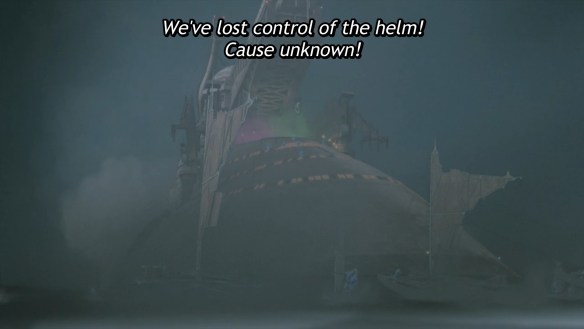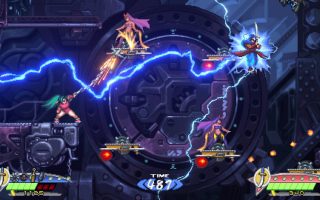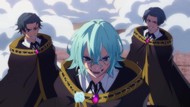Hello folks, and welcome back to Wrong Every Time. Today we’re returning to Trigun Stampede in a moment of crisis, as the Sand Steamer carrying our heroes to JuLai has come under attack from both Wolfwood’s old companion Livio and a small army of bandits. Confronted with this shadow of the boy he once sought to protect, Wolfwood’s alleged cynicism has been put to the test, as he struggles to uphold the same cutthroat critiques he has leveled at Vash’s idealism.
So yes, we are currently deep in The Good Stuff, matching this production’s most complex action tableau with its most urgent contrast of Vash and Wolfwood’s ideals. Both of them are fundamentally humanists, and both of them are also to some extent hypocrites; Vash’s pacifist values require him to often ignore the second-order effects of his actions, while Wolfwood’s callous odes to self-reliance hide an underlying desire to protect those who cannot protect themselves. But it is neither Vash nor Wolfwood who is truly wrong; these are all simply the consequences of maintaining compassion in a fallen world, where human existence is so fragile that the better angels of our nature must fight to overcome pragmatism and hopelessness at every turn. Whatever shields our leads must develop to maintain that humanist hope, whether it’s Vash’s selective perspective or Wolfwood’s fatalistic facade, it is far better to find peace with hypocrisy than to genuinely harden our hearts. Peaceful coexistence might be an impossible dream, but we must seek it all the same; ultimately, it is only when we lose faith in each other that we are truly lost.
Episode 7
Nice vocal distortion effect as we return to the action, with the Sand Steamer’s captain crying out through tinny speakers that they’ve lost control of the helm
It seems another of Wolfwood’s companions possesses the ability to remotely take control of the vehicle. These Eye of Michael folks are a convenient device, one that it feels Stampede is working harder to integrate into the world than the original Trigun (or at least its adaptation). They seemed a bit more like improbable roaming supervillains there, while here they’re all in some way reflective of Wolfwood and Vash’s history, or of the mechanics of the supersoldier-creation system
Which, I suppose, also reflects the convenience of having Trigun’s entire story to work with, rather than just adapting portions as it goes along. Many shonen manga start as monster-of-the-week narratives before eventually developing enough context and history to transition to their eventual core narrative. This is an unsurprising consequence of the weekly manga publication system, wherein one dull week might get you canceled – so obviously, you make your narratives short, ensuring each new week has a new monster and new story to tell. Of course, this system naturally results in disjointed, largely episodic narratives, whereas a retroactive adaptation can draw only what is most useful from those early, aimless chapters, and tether everything together into a more coherent story that seems driven and purposeful from the start
The Sand Steamer is quite a visual setpiece, maintaining a good balance of finicky mechanical details and sheer, whale-like slopes
The ship is now headed for Hopeland, and Wolfwood’s orphanage!
Love the neon glow of these bandits’ armor. Obviously there’d be no reason to make yourself such an easy target as an actual bandit, but damnit, we’re here to have fun
We get some fun CG spins around Wolfwood as he lays into the bandits. Interesting how CG animation naturally leads to a distinct cinematographic language relative to traditional animation; both mediums are basically designed around celebrating their strengths and hiding their constraints, so traditional animation prioritizes storyboarding and the main objects in frame (taking your attention away from the stillness of the camera), while CG animation prioritizes camera movement and the complexity of interaction between foreground and background (taking your attention away from the detail of the objects in frame)
“If you stay here, we’ll just die together!” Wolfwood again proving the limitations of his alleged cynicism, clearly stating he’s willing to die both to protect Vash and to not hurt his old friend
In that regard, Vash is actually stronger than Wolfwood; he is willing to “shoulder the weight of his ideals,” to believe in a seemingly impossible better future, and pursue it no matter the personal cost
Of course, Wolfwood is quite literally bearing a heavy cross as well
Knowing Wolfwood was a test subject from the start also lets this version ground its conflict a bit more; Wolfwood’s seemingly superhuman abilities are given context, which means we avoid the original Trigun effect of “oh, people are just magic, deaths will only occur when Nightow deems it necessary”
Meanwhile, Meryl is being bullied into taking glamour shots of the bandits. Kinda feel bad about having so much fun with her mopey expressions here; Orange are really outdoing themselves with the expression work in this one
Ooh, this is also a fun idea – Vash spins his pistol around for hand-to-hand combat, essentially using it as a tonfa to beat the crap out of these bandits
Livio’s practice of always chasing after Wolfwood is given a grim new interpretation, now framed as him seeking the same destructive modifications so he could catch up to his idol
God, these little sequences of traditional animation for their childhood flashbacks are so nice. The wobbling lineart creates such a charming, inherently nostalgic effect, as if the forms aren’t congealing because Wolfwood is struggling to remember the details. It actually reminds me of the similarly wobbly effect used for Nichijou’s Helvetica Standard sequences
Vash tells Wolfwood to find something that Livio would “never forget,” prompting Wolfwood to use the scent memory of his cigarettes. Smells and songs, both portals to forgotten memories
Another smart use of the panning cam as Livio goes berserk, the disconnect between his past and programmed self prompting him to see enemies all around him. Panning shots like this create a natural sense of paranoia; with the assumed “correct” direction of the camera abandoned, the audience is invited to wonder what threats might be hiding in any other direction
Ultimately he turns the gun on himself, and tumbles off the Sand Steamer
“Lack of faith is the problem. Without his little brother, without the orphanage, he can be the perfect soldier.” The mastermind of the Eye of Michael’s current plan sees Wolfwood’s attachments as his weakness, which basically just means his empathy. Like Vash, the only limit on his power is his compassion – and these folks cannot understand the immense strength it requires to be gentle, to be kind
“I just want to spread the good word, that’s all.” As is so often the case, the Eye of Michael uses religion to divert us from general humanism into worship of a specific set of arbitrary principles
Granted, most people don’t actually default to some kind of enlightened humanism in the first place, so some degree of social moral instruction is certainly necessary. Part of the point of this story is that being Vash is difficult even for Vash himself
“We’ll make it happen with guts and grit!” With his own home and orphanage on the line, Wolfwood starts to sound a lot more like Vash, embracing idealism in spite of it all
“Why does this ship even have an ion cannon!?” Thank you, Meryl
Her reasonably question actually facilitates more flourishes of this story’s distinctive worldbuilding; the Sand Steamer was of course excavated from a space-faring vessel, and thus Vash can hopefully interface with it
“The only way now is to move the ship or cannon manually.” Ah, the fun way
This episode is a fine demonstration of the importance of texture in CG animation. It’s all about mechanical objects, which are generally the most convenient choices for CG (as they maintain solid forms, never bending or stretching), but which also tend to look out of place due to their formal lines and block colors. Orange are doing a great job here of texturing the Sand Steamer such that it still looks somewhat uneven and organic, preventing this from looking too artificial
“What’s your job? It’s to survive and write an article about this.” Even Meryl being challenged on her values here
“If only I had held onto Tonis, he wouldn’t have lost his arm. If I run away now, I’ll feel the same way.” Morality is a funny thing. “I don’t want to suffer the self-recrimination of failing to be brave and selfless” is a somewhat circular path to righteousness, but it’s a reliable route all the same
“I’m sorry, Wolfwood.” “Save it for when everything works out!” With his own treasure on the line, Wolfwood continues to take Vash’s role as the hopeless idealist
“If you can’t kill anyone, you can’t save anyone!” In spite of saying this, Wolfwood agrees to try Vash’s methods, even with his town’s safety in question. Seems like he’s beginning to believe in Vash
And of course, this prompts a kindly smile from Vash that Wolfwood absolutely can’t stand
I appreciate that Meryl’s actually getting something important to do here, manning the control station while the other two physically navigate the ship. She was generally just an observer in the original, so this is nice to see
Vash actually interacts with the Steamer’s plant directly, which seems to unfold into something approaching a humanoid form. So are Vash and these plants both subspecies of the same alien race?
Yep, he shares the same patterns that they do
And Done
Whew, that was one tumultuous episode! As befitting the followup to last episode’s intense cliffhanger, we roared right out the gate with multiple would-be catastrophes at once, facing both the tortured specter of Livio and the imminent destruction of Hopeland. Unsurprisingly, this violent conflagration of Wolfwood’s worst fears served as an excellent way to challenge his alleged values, revealing that in the right circumstances, he can be even more idealistic and self-sacrificing than Vash. That, in turn, offers the natural counter to his own original challenge to Vash – that it is easy to be kind when you are strong, but far more difficult to maintain your ideals when you are weak, desperate, and uncertain even of survival. Without any of Vash’s gifts, and with every reason to despise his fellow humans, Wolfwood nonetheless chooses to embody what is greatest about us. Just don’t let him hear you say it, though.
This article was made possible by reader support. Thank you all for all that you do.




